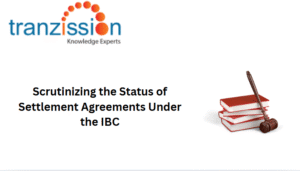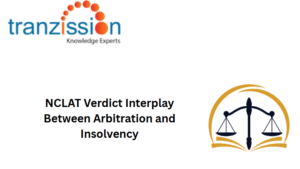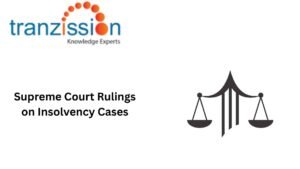
Supreme Court’s Take on Personal Insolvency in IBC

Table of Contents
The Supreme Court’s take on personal insolvency in IBC has brought significant focus on the role of personal guarantors in insolvency law. A personal guarantor, by promising to repay corporate debts, faces substantial liabilities if corporate debtors default, putting their personal assets at risk. This interpretation under IBC highlights potential disadvantages for guarantors and raises key issues in India’s insolvency landscape.
Background of the Insolvency and Bankruptcy Code
The insolvency laws before the establishment of the Insolvency and Bankruptcy Code, 2016 (IBC) were scattered, which resulted in undue delays. The IBC was enacted for the reorganisation and resolution of corporate persons, partnership firms, and individuals in a timely manner to maximising the asset’s value. The Amending Act 8 of 2018 amendment section 2(e) of IBC introduced provisions of the IBC applicable to personal guarantors. Notification No. S.O. 4126 dated 15 November 2019 of the Ministry of Corporate Affairs, under Part III of the IBC the provisions applicable to the corporate debtor’s guarantors were notified. Notification No. S.O. 4126n was challenged before the Supreme Court in Lalit Kumar Jain Vs. Union of India on the ground that the Central Government had no power under section 1(3) of IBC to amend the law only to personal guarantors. It was held that the liability of a personal guarantor is not discharged because of the discharge of the liability of the principal debtor.
Constitutional Challenge to the IBC Provisions
Notification No. S.O. 4126n was challenged before the Supreme Court in Lalit Kumar Jain Vs. Union of India on the ground that the Central Government had no power under section 1(3) of IBC to amend the law only to personal guarantors. It was held that the liability of a personal guarantor is not discharged because of the discharge of the liability of the principal debtor. In Dilip B Jiwrajka Vs. Union of India, the Supreme Court upheld the constitutionality of the IBC provisions relating to personal guarantors, agreeing to the judgment of Lalit Kumar Jain Vs. Union of India.
The Supreme Court’s Judgment
Sections 95-100 under Part III of the IBC were upheld by the Supreme Court in Dilip B Jiwrajka Vs. Union of India on November 9, 2023. In Part III, the RP has the duty to investigate and apply an interim moratorium period before the corporate debtor makes a case under section 100, which violates the principles of natural justice. The petitioner, in this case, contended before theSupreme Court’s Take on Personal Insolvency in IBC: Sections 95-100 violate the principles of natural justice as they fail to review any opportunity of hearing to the personal guarantor when the application is admitted by the National Company Law Tribunal (NCLT) under section 95. The petitioners also contended that the appointment of the resolution professional (RP) may affect the fundamental rights of the personal guarantor if they do so without allowing the personal guarantors to be heard. An interim moratorium period is imposed under section 96 on the personal guarantor when an application is filed under section 95. In this case, the Supreme Court’s take on personal insolvency in IBC has held that section 96 is protective, regarding the debts of the corporate debtor.
Key Aspects of the Insolvency Resolution Process (IRP) for Personal Guarantors
Part II and Part III of the IBC allow the NCLT to take action immediately after receiving an insolvency resolution process (IRP) application under section 95 without admission. Section 96 imposes an interim moratorium on the debts when an application is filed under section 95, which suspends the debt-related legal proceedings. The Insolvency and Bankruptcy Board of India (IBBI) allows the NCLT to appoint a resolution professional, who will review the application and advise the NCLT on its approval or rejection. After applying, the NCLT may pass an order approving or rejecting the application, which is binding on all parties involved.
Analysis of the Grounds of Challenge
The Supreme Court’s take on personal insolvency in IBC has in Dilip B Jiwrajka Vs. Union of India interpreted the IBC provisions applicable to personal guarantors, the Notification of 2015, and the Amending Act, focusing on the interim moratorium, the role of the resolution professional, and the principles of natural justice.
- Interim Moratorium: As per section 96, the Court observed that the interim moratorium has a protective nature against any legal actions or proceedings relating to the debt, and not the debtor when the application under section 95 is filed. This interim moratorium period is different from the period under section 14 of the IBC when the corporate insolvency resolution process (CIRP) is initiated, as the interim moratorium stops any ongoing or potential legal disputes against the debt.
- Appointment of Resolution Professional: The petitioners argued that section 97 states that the NCLT shall appoint the RP on the application under section 95. The NCLT had been deprived of its adjudicatory powers in this case. It was further argued that the appointment of the RP may affect the fundamental rights under Article 14 of the Constitution of India and infringe on the principle of natural justice of being heard by the personal guarantors. The Supreme Court’s take on personal insolvency in IBC has held that there exists intelligible differentia of the resolution process under Part II and Part III, which distinguishes the roles of the RP under these parts.
- Principles of Natural Justice: The Court affirmed that the principles of natural justice, the right to be heard and against biases, should ensure that the individuals are affected by the IRP and are given a chance to present their case. The IBC has provisions that specifically state that personal guarantors with an opportunity to be involved with the resolution process and fulfill the principles of natural justice.
- Powers of the Resolution Professional: In section 97 of the IBC, the NCLT appoints an RP who, according to their duty under Section 99, examines the application under Section 95 and seeks additional information to assess the financial situation. The Supreme Court’s take on personal insolvency in IBC has held that the RP’s report is recommendatory and has no binding power, therefore, the role of the RP is more advisory than judicial.
- Implications of the Ruling: This judgment has helped creditors collect their debts and instills resolution in the resolution process to the personal guarantor’s applications. The incorporation is hence important for creditors, especially banks and financial institutions, corporate debtors, and other stakeholders. However, it has also raised concerns about the potential dominance of lenders and the requirement for a balanced approach. It also adversely affects promoters and directors, whose assets may be at risk.
Recommendations for Improvement
The default threshold of personal guarantors is significantly lower than that of corporate debtors. However the judgement in Dilip B Jiwrajka Vs. Union of India has made a significant step towards creditors, especially banks and financial situations, to resolve their debts. Under CIRP, personal guarantors face ambiguity, which raises an issue on the scope of liability, while the amendments of the IBC offer clarity regarding this issue, particularly when there are a number of guarantors. There is also a need to introduce a framework to protect personal guarantors during the resolution process under Part III to ensure transparency, efficiency, and effectiveness of the IBC. To balance the interests of the corporate debtors creditors and their guarantors it is important to maintain a healthy credit market while ensuring economic development.
Conclusion: Supreme Court’s Take on Personal Insolvency in IBC
The Supreme Court’s take on personal insolvency in IBC has significantly impacted insolvency law. Judicial precedents have clarified personal guarantors’ involvement, treatment, and liability during the resolution process. By being the personal guarantor of a corporate debtor, an individual may have to forfeit their personal assets, loss of commercial value of the business, and their creditworthiness. As per Dilip B Jiwrajka Vs. Union of India prompts caution among promoters and individuals who offer to act as personal guarantors about the risk involved. There needs to be clarity during the resolution procedure and in insolvency law to remain fair and efficient.





